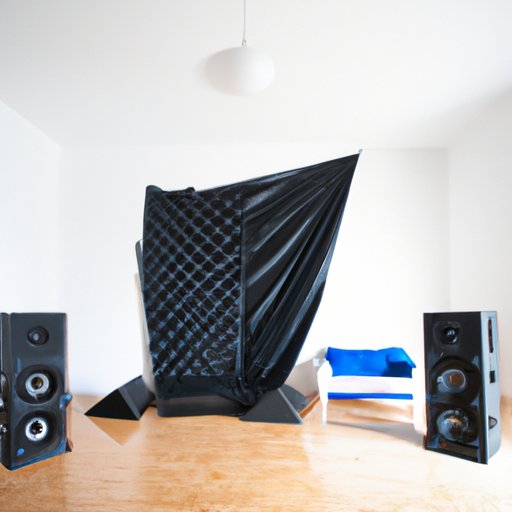Introduction
Whether you live in a bustling city or a quieter suburban area, noise can be a consistent source of disruption. Soundproofing your home or workspace can be a great solution to reduce unwanted noise. When considering how to soundproof a room, one must take into account various aspects such as the type of wall, the temperature and humidity, and the desired outcome. In this article, we will guide you through different soundproofing methods that you can use to create a quieter space.
Soundproofing 101: A Beginner’s Guide to a Quieter Room
Before getting into the nitty-gritty of soundproofing a room, it’s essential to have a basic understanding of how sound waves work and travel. Sound waves are vibrations in the air that radiate from their origin source. Thus, they can travel through the walls, floors, and doors of your home. This ability to transfer from one space to another is called sound transmission.
The basics of soundproofing a room involve the creation of sound barriers that can lessen the transfer of sound waves from one space to another. Different materials can create these barriers, including curtains, blankets, fiberglass, and acoustic panels. The more sound barriers you create, the better you can isolate sound.
DIY Soundproofing: Affordable and Effective Techniques for Any Room
If you’re looking for affordable soundproofing solutions for your home, several DIY techniques can be used, including acoustic foam, corkboard, and weatherstripping. These materials can be purchased relatively cheaply and installed by anyone with basic home improvement skills.
Acoustic foam is an excellent soundproofing material that can be cut to size and easily installed on walls and doors. Corkboard is another great material that is easy to install and absorbs sound waves. Weatherstripping can also be used to seal gaps around doors and windows to reduce sound transmission.
Soundproofing for Musicians: Tips and Techniques for Creating a Soundproof Home Studio
Musicians typically require rooms that are as sound-free as possible to achieve the best audio quality. While creating a soundproof home studio may seem challenging, it is achievable with the correct techniques and materials. These may include sound-dampening curtains, bass traps, and acoustic panels.
One cost-effective material that can help in soundproofing a recording studio is soundproofing insulation found in many hardware stores. Another option is to construct an independent room within your existing space in which to practice or record music.
Beyond the Basics: Advanced Soundproofing Techniques for Commercial and Industrial Settings
Advanced soundproofing techniques, such as sound barriers, white noise machines, and acoustic panels, are used to reduce noise levels effectively in commercial and industrial settings. Sound barriers use materials such as heavy-duty vinyl or concrete to isolate sound from one area to another.
White noise machines work by producing a consistent sound that can mask other unwanted sounds, while acoustic panels can absorb sound waves and reduce echo in large rooms.
Home Theater Soundproofing: How to Achieve Cinema-Quality Audio in Your Living Room
Creating a home theater soundproofing involves minimizing echo and creating an isolated sound environment. When soundproofing walls, it is essential to use materials such as drywall or acoustic panels, which are effective in reducing sound transmission. Furniture selection and placement can also play a significant role in soundproofing a living room, both reducing echo and enhancing sound quality.
Upgrading your surround sound system is another effective way of improving audio quality. Finally, décor can be used to create a more acoustically friendly space. For example, a large rug can help absorb sound and reduce echo in a living room.
Conclusion
In conclusion, soundproofing is an effective solution to reduce unwanted noise in any space, whether residential or commercial. From the basics to advanced techniques, our guide has provided essential information that will enable you to soundproof your room effectively.
Investing in soundproofing today can significantly improve your quality of life by giving the much-needed peace and quiet you require. Keep in mind that your level of expertise and the outcome you desire will influence your soundproofing approach. Fortunately, there is a technique for everyone, no matter your budget or skillset.
